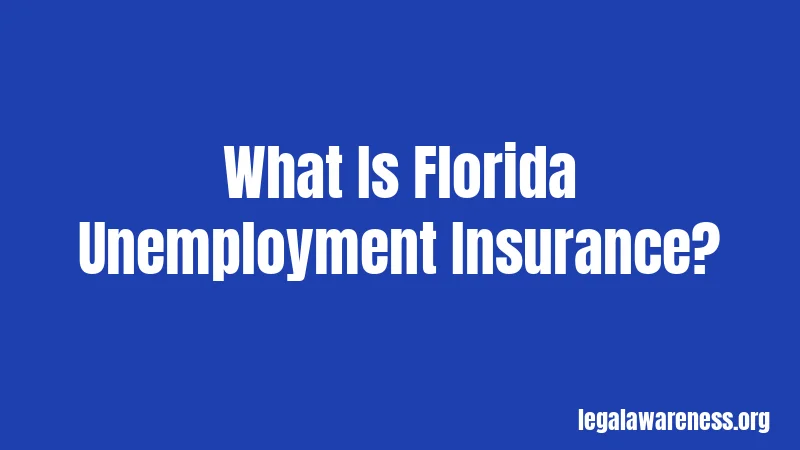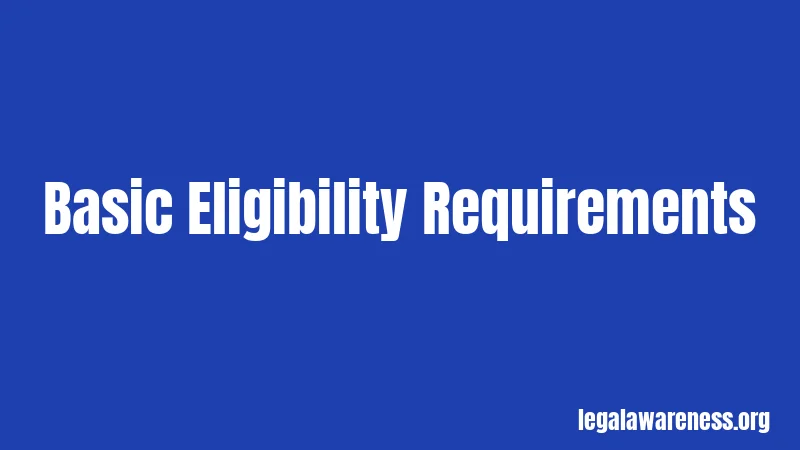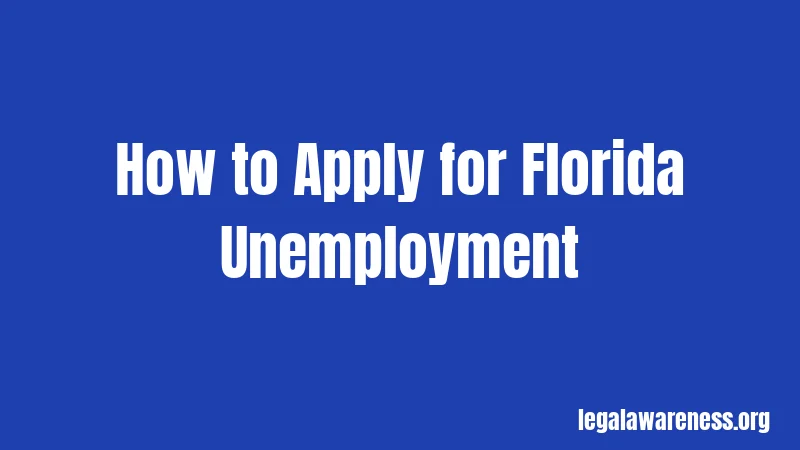Florida Unemployment Laws (2026): What You Need to Claim Benefits
Most people have no idea how unemployment benefits actually work in Florida. Seriously. The rules are stricter than you might think. But here’s the good news: once you understand them, the process gets a lot easier. Let’s walk through exactly what you need to know.
Lost your job? Florida’s unemployment system exists to help. It provides temporary financial support while you search for new work. But you can’t just apply and hope for the best. There are specific rules you must follow.
What Is Florida Unemployment Insurance?

Think of it like a safety net. When you lose your job, unemployment insurance provides weekly payments. These payments help cover your bills while you look for work. Florida’s system is run by the Department of Economic Opportunity (DEO).
Here’s the thing: unemployment insurance isn’t free money. You’ve already paid into it. Your employer made contributions on your behalf. Now it’s there for you when you need it. Pretty straightforward, right?
Who Qualifies for Florida Unemployment Benefits?
Not everyone who loses a job qualifies. You need to meet specific requirements. Let me break down the main rules.
First, you must have lost your job through no fault of your own. Got fired for stealing? You won’t qualify. Quit because you didn’t like your boss? Sorry, you’re out of luck. Laid off due to business closure? Yes, you probably qualify.
You also need to have worked in Florida during the past 18 months. Specifically, you need at least two quarters (six months) of work. A quarter is basically a three-month period. So if you worked January through March, that’s one quarter. Your job must have been covered by Florida unemployment insurance too.
Wondering if your job counts? Most employment is covered. Independent contractors and self-employed workers are usually not covered. Neither are certain government workers or family members working for family businesses.
Basic Eligibility Requirements

Let’s get into the specifics you need to know.
You Lost Your Job Without Your Fault
This is huge. Understand it clearly. Your employer must have let you go. You didn’t choose to leave. Layoffs, business closures, and downsizing all count. Even getting fired for poor performance might work, depending on circumstances. But quitting voluntarily? That disqualifies you.
Hold on, this part is important. There’s an exception. If you quit with good cause, you might still qualify. What counts as good cause? Working conditions that are dangerous. Wage theft or non-payment. Sexual harassment. These situations can make you eligible even though you quit.
You Earned Enough Income
Florida looks at your earnings during your “base period.” This is the four quarters before you filed for benefits. You need to have earned enough to qualify.
Here’s where it gets specific. Your highest quarter earnings must be at least 1.5 times your lowest quarter earnings. Plus, your total earnings across all four quarters must equal at least 40 times the state’s weekly wage.
Sound complicated? Let me explain it differently. Basically, you need to have earned a reasonable amount of money. The state checks that you’re not just barely working. You need substantial recent employment history.
You’re Actively Looking for Work
This isn’t optional. You must actively search for new employment. You can’t just sit home and collect benefits. The state expects you to apply for jobs regularly.
What counts as active job searching? Applying online is good. Visiting employers in person works too. Using employment agencies, attending job fairs, or sending out resumes all count. Keep records of your job search efforts.
Weekly Benefits and Maximum Amounts
Okay, let’s talk money. How much will you actually get?
Florida’s weekly benefit amount depends on your earnings history. The state calculates your average weekly wage. Then it pays you a percentage of that amount. Currently, the maximum weekly benefit is around $350 per week. I say “around” because this amount can change.
Your actual payment will probably be lower than the maximum. It’s based on what you earned. Earned $600 per week at your old job? Your benefit might be around $300 per week. Earned $1,000 per week? You might still hit that $350 maximum cap.
How long can you collect? That depends on the overall unemployment rate. In most situations, you can collect for up to 12 weeks of benefits. If the unemployment rate is really high, you might get extended benefits for longer. During economic crises, Congress sometimes creates additional weeks.
How to Apply for Florida Unemployment

Ready to get started? Here’s what you need to do.
The easiest way is online. Visit the Florida DEO website at CONNECT.MYFLORIDA.COM. You’ll create an account and complete the application. Have your Social Security number, driver’s license, and work history ready. The application takes about 20 minutes.
You can also apply by phone if you prefer. Call 1-833-FLA-UNEMP (1-833-352-8367). Be prepared to answer questions about your job history and why you lost your job. Have your information ready before you call. You’ll wait on hold, but they’ll help you through the process.
Here’s what happens next. The DEO reviews your application. They contact your previous employer. Your employer provides their side of the story. This usually takes one to two weeks. Then you’ll get a determination letter explaining if you qualify.
Not sure what counts as a violation? Here’s the thing: you need to be honest on your application. Lying about your job loss or earnings can get you denied. It can also lead to fraud charges. Just tell the truth.
Important Requirements While Collecting Benefits
Once you start receiving benefits, you have responsibilities.
File Weekly Continued Claims
You must file weekly. This is mandatory. Every week, you log back into CONNECT and answer questions about your job search. Did you work any hours? Did you earn any money? Are you still looking for work? Answer honestly.
Miss a week? You won’t receive that week’s payment. It’s gone. You don’t get paid retroactively later. So make it a habit. File every Sunday evening or Monday morning. Set a phone reminder if you need to.
Report Any Income You Earn
Working part-time while collecting unemployment? That’s allowed. But you must report it. The state will reduce your benefits by the amount you earned. It’s called “offset.”
Here’s how it works. You earn $100 one week. Your weekly benefit is $250. That week, you get $150 instead. Pretty straightforward. Report everything, even if it’s just a few hours of work.
Participate in Required Training or Job Services
Sometimes the DEO requires you to participate in job training. They might refer you to workshops about resume writing or interview skills. You might need to attend job fairs or see a career counselor.
Okay, pause. Read this carefully. If they require something and you don’t do it, you lose your benefits. No exceptions. So if you get a referral, take it seriously. Attend the sessions. Complete the requirements.
Reasons You Might Get Denied
Not getting benefits? It might be one of these reasons.
You quit your job voluntarily. Without good cause, this disqualifies you. Your employer says you were fired for misconduct. Tardiness, not following rules, or poor attitude can count. You weren’t earning enough during the base period. You failed to meet the income thresholds. You didn’t work enough quarters in Florida. You’re not actively searching for work.
I looked this up recently. Denials also happen when people provide false information. They might lie about their job loss or earnings. The DEO catches these mistakes, sometimes months later. Then you owe back all the benefits they paid you.
Appealing a Denial
Got denied? Don’t give up. You can appeal.
You have 20 days from the denial letter. That’s your window. File an appeal through CONNECT or by mail. Explain why you believe the decision was wrong. Provide any evidence you have.
You’ll have a hearing. An appeals referee will listen to both sides. Your employer will present their case. You’ll present yours. Then the referee decides. They might overturn the denial or uphold it. If you disagree with the referee’s decision, you can appeal further.
Want a lawyer? You can hire one, but it’s not required. Many people handle appeals themselves. Just be prepared. Bring documentation. Have your facts straight.
Special Situations in Florida
Seasonal Work
Working seasonal jobs? The rules get a bit different. You might qualify even between seasons. As long as you expect to return to seasonal work, you can collect benefits during the off-season.
Partial Unemployment
Lost hours but still employed? You might qualify for partial unemployment benefits. If your employer cut your hours, you could receive partial benefits. The amount depends on how much you’re earning in the reduced hours.
Self-Employment and Gig Work
Here’s the honest truth: self-employed people usually can’t get unemployment benefits. Independent contractors don’t qualify. This includes gig workers like Uber drivers or freelancers. You didn’t pay into the system the same way.
However, if you were misclassified as a contractor when you should have been an employee, you might have a case. This is getting complicated legally. If this applies to you, contact a labor attorney.
Recent Changes to Florida Unemployment Laws
Florida’s been making changes. Here’s what’s happened recently.
The waiting period got eliminated. Years ago, you had to wait a week before benefits started. Now you don’t. Benefits can start immediately if you qualify. That’s good news.
The state also updated its CONNECT system. It’s the online platform for applying and filing claims. The system had major problems a few years back. It’s been improved, but it still has issues sometimes. If you’re having trouble accessing it, call the helpline.
Work-sharing programs expanded. If your employer participates, you might qualify for partial benefits while working reduced hours. Your employer and the state work together on this arrangement. It helps keep you employed while you receive some benefits.
How Long Do Benefits Last?
This is the question everyone asks.
Standard unemployment benefits last 12 weeks. That’s three months of payments. After 12 weeks, your benefits end. You don’t automatically get extended benefits.
Extended benefits happen during recessions or high unemployment periods. If the state’s unemployment rate is high enough, you can get additional weeks. During the 2020 pandemic, Congress added huge extensions. People could collect for months and months.
Currently, with lower unemployment rates, most people get just 12 weeks. Will that change? It depends on the economy. If a recession hits, extended benefits become available.
Tax Implications of Unemployment Benefits
Wait, it gets better. Or worse, depending on your perspective.
Unemployment benefits are taxable income. You owe federal income tax on them. The amount depends on your total income and filing status. You might owe taxes at the end of the year.
Here’s what you can do. Request tax withholding from your benefits. When you apply through CONNECT, you can choose to have taxes withheld. The state holds back a portion of your payment. Then when you file taxes, you won’t owe as much. It’s optional, but most people do it.
Not sure what you’ll owe? That depends on your specific situation. Talk to a tax professional. They can help you understand your tax liability. File your taxes on time to avoid penalties.
Fraud and Penalties
This part’s serious. Unemployment fraud is a big deal.
What counts as fraud? Lying on your application. Failing to report income. Claiming weeks you didn’t actually work. Working while claiming you were unemployed. Using someone else’s identity or information.
You’re not alone, this confuses a lot of people. But the state takes it very seriously. If they catch fraud, you’ll repay all the benefits. You’ll face penalties of 15 to 50 percent of the benefits you received. Criminal charges are possible too. Felonies can mean jail time.
The state has gotten better at catching fraud. They cross-check information. They verify employment history. They use data analysis to spot suspicious claims. So don’t risk it. Be honest on every application and every weekly claim.
Frequently Asked Questions
How much will I receive each week?
Your weekly benefit amount depends on your previous earnings. The maximum is around $350 per week in Florida. Your actual amount is usually less. The state calculates your average weekly wage and pays a percentage of that. The exact amount appears in your eligibility determination letter.
What if my employer says I quit when I was actually fired?
You’ll go through the appeals process. At the hearing, you and your employer both present evidence. The appeals referee decides. Bring written proof if you have it. Text messages, emails, or witness statements help your case.
Can I collect unemployment while going to school?
It depends on your school schedule. If you’re attending school full-time, you’re probably not available for work. The DEO will likely deny your claim. Part-time school might be okay if you’re actively looking for work around your schedule.
What happens if I get a new job while collecting benefits?
Tell the DEO immediately. Report your employment and earnings each week on your continued claim. Your benefits will be reduced based on what you earn. Once you earn enough, your benefits stop. This is all normal and expected.
Can I move to another state and still collect Florida benefits?
Yes, you can move and collect. However, you must register for work in your new state. You must comply with their work-search requirements. Some states are easier to deal with than others. Keep filing your weekly claims through Florida’s CONNECT system.
Final Thoughts
Now you know the basics of Florida unemployment. Losing a job is stressful. But understanding your benefits makes it easier. You’re not completely alone financially while you search for work.
Here’s what to remember: apply quickly if you lose your job. File your weekly claims on time. Report any income honestly. Stay active in your job search. Follow all the requirements. If you get denied, appeal within 20 days.
Stay informed. If something seems unclear, contact the Florida DEO. They have representatives who can answer questions. Your success in getting benefits depends on understanding the rules. Now that you do, you’re ready to navigate the system.
